Top Rankings
Melrose Public School District ranks among the top 20% of public school district in Minnesota for:
Category
Attribute
Graduation Rate
Highest graduation rate (Top 20%)
For the 2025 school year, there are 2 public elementary schools serving 762 students in Melrose Public School District. This district's average elementary testing ranking is 6/10, which is in the top 50% of public elementary schools in Minnesota.
Public Elementary Schools in Melrose Public School District have an average math proficiency score of 49% (versus the Minnesota public elementary school average of 47%), and reading proficiency score of 48% (versus the 51% statewide average).
Minority enrollment is 34% of the student body (majority Hispanic), which is less than the Minnesota public elementary school average of 40% (majority Black and Hispanic).
Overview
This School District
This State (MN)
# Schools
3 Schools
1,655 Schools
# Students
1,266 Students
571,925 Students
# Teachers
85 Teachers
40,363 Teachers
Student : Teacher Ratio
15:1
15:1
District Rank
Melrose Public School District, which is ranked within the top 50% of all 522 school districts in Minnesota (based off of combined math and reading proficiency testing data) for the 2021-2022 school year.
The school district's graduation rate of 90-94% has decreased from 95% over five school years.
Overall District Rank
#208 out of 527 school districts
(Top 50%)
(Top 50%)
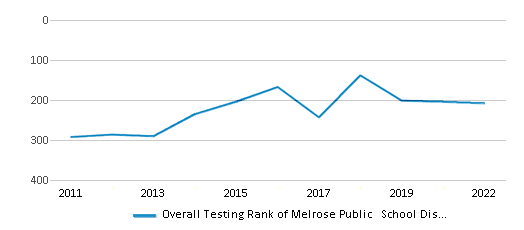
Math Test Scores (% Proficient)
48%
45%
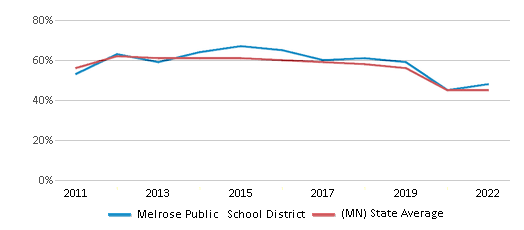
Reading/Language Arts Test Scores (% Proficient)
48%
51%
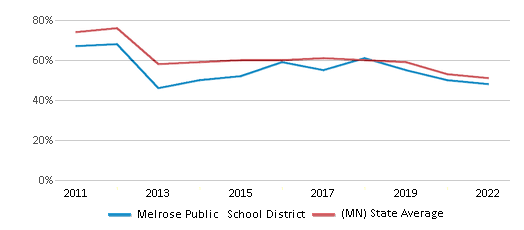
Science Test Scores (% Proficient)
36%
41%
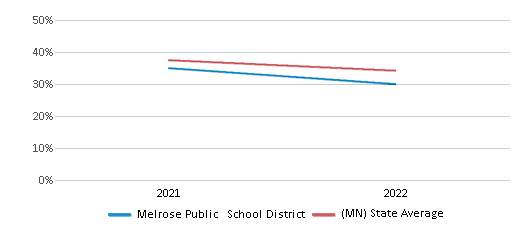
Graduation Rate
90-94%
84%
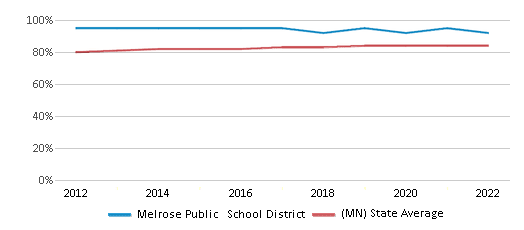
Students by Ethnicity:
Diversity Score
0.45
0.61
# American Indian Students
1 Student
10,480 Students
% American Indian Students
n/a
2%
# Asian Students
1 Student
42,165 Students
% Asian Students
n/a
7%
# Hispanic Students
382 Students
65,127 Students
% Hispanic Students
30%
12%
# Black Students
1 Student
70,794 Students
% Black Students
n/a
12%
# White Students
866 Students
344,281 Students
% White Students
69%
60%
# Hawaiian Students
n/a
676 Students
% Hawaiian Students
n/a
n/a
# Two or more races Students
15 Students
38,402 Students
% of Two or more races Students
1%
7%
Students by Grade:
# Students in PK Grade:
26
10,698
# Students in K Grade:
83
57,031
# Students in 1st Grade:
86
61,859
# Students in 2nd Grade:
68
63,560
# Students in 3rd Grade:
84
61,751
# Students in 4th Grade:
60
63,575
# Students in 5th Grade:
69
63,290
# Students in 6th Grade:
77
63,180
# Students in 7th Grade:
99
53,666
# Students in 8th Grade:
110
53,924
# Students in 9th Grade:
145
4,107
# Students in 10th Grade:
122
4,634
# Students in 11th Grade:
116
4,740
# Students in 12th Grade:
121
5,910
# Ungraded Students:
-
-
District Revenue and Spending
The revenue/student of $14,977 in this school district is less than the state median of $17,854. The school district revenue/student has stayed relatively flat over four school years.
The school district's spending/student of $14,522 is less than the state median of $18,580. The school district spending/student has stayed relatively flat over four school years.
Total Revenue
$19 MM
$15,547 MM
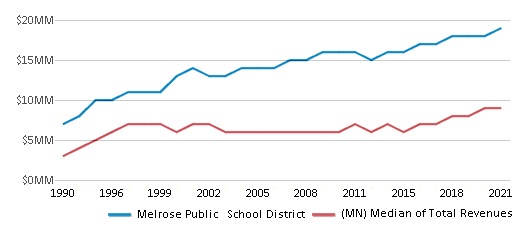
Spending
$18 MM
$16,179 MM
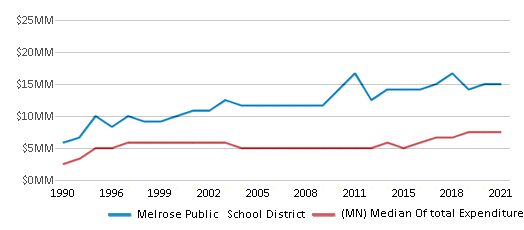
Revenue / Student
$14,977
$17,854
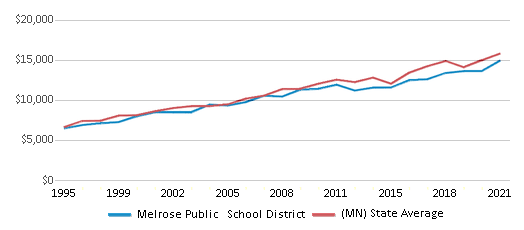
Spending / Student
$14,522
$18,580
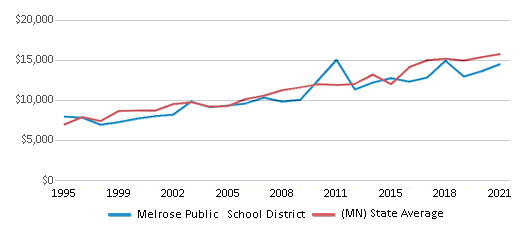
Best Melrose Public School District Public Elementary Schools (2025)
School
(Math and Reading Proficiency)
(Math and Reading Proficiency)
Location
Grades
Students
Rank: #11.
Melrose Elementary School
(Math: 57% | Reading: 47%)
Rank:
Rank:
7/
Top 50%10
566 5th Ave Ne
Melrose, MN 56352
(320) 256-5160
Melrose, MN 56352
(320) 256-5160
Grades: PK-5
| 476 students
Rank: #22.
Melrose Middle School
(Math: 44% | Reading: 48%)
Rank:
Rank:
5/
Bottom 50%10
546 5th Ave Ne
Melrose, MN 56352
(320) 256-5160
Melrose, MN 56352
(320) 256-5160
Grades: 6-8
| 286 students
Recent Articles

What Is A Charter School?
Explore the world of charter schools in this comprehensive guide. Learn about their history, how they operate, and the pros and cons of this educational innovation. Discover key facts about charter schools, including admission policies, demographics, and funding, as well as what to look for when considering a charter school for your child.

10 Reasons Why High School Sports Benefit Students
Discover the 10 compelling reasons why high school sports are beneficial for students. This comprehensive article explores how athletics enhance academic performance, foster personal growth, and develop crucial life skills. From improved fitness and time management to leadership development and community representation, learn why participating in high school sports can be a game-changer for students' overall success and well-being.

February 05, 2025
Understanding the U.S. Department of Education: Structure, Impact, and EvolutionWe explore how the Department of Education shapes American education, from its cabinet-level leadership to its impact on millions of students, written for general audiences seeking clarity on this vital institution.





